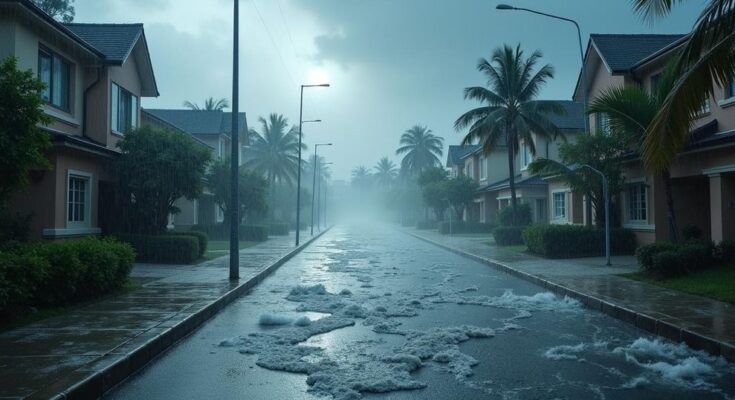Human-induced climate change has intensified Hurricane Helene’s rainfall by 10% and wind speeds by 11%. Following Helene, scientists warn that Hurricane Milton may experience similar effects. The findings indicate a significant link between climate change and the frequency and destructiveness of hurricanes, highlighting the urgent need for mitigation strategies.
Recent scientific research has demonstrated that human-induced climate change has intensified Hurricane Helene, increasing its rainfall by roughly 10% and augmenting wind speeds by approximately 11%. This information is particularly pertinent as Hurricane Milton is presently gaining strength and poses a threat to Florida’s coastal areas. The study conducted by World Weather Attribution (WWA) revealed that climate change raised Helene’s wind speeds by about 13 miles per hour and escalated the likelihood of high sea temperatures that significantly contributed to the storm’s intensity. Specifically, ocean temperatures in the Gulf of Mexico were reported to be 3.6 degrees Fahrenheit above average. Ben Clarke, a climate researcher at Imperial College London and co-author of the study, noted that the warmer air’s capacity to hold increased moisture led to unprecedented levels of rainfall during Helene, which already would have been significant due to the weather conditions at the time. Researchers have warned that the impacts of ongoing fossil fuel combustion will likely yield more catastrophic storms similar to Helene, resulting in severe inland flooding, a peril demonstrated by the fatalities experienced during Helene when many casualties were attributed to substantial flooding rather than wind damage. Hurricane Helene made landfall in Florida with a catastrophic storm surge measuring 15 feet and sustained winds reaching 140 miles per hour, impacting several states including Georgia and Virginia and leading to over 230 deaths. The storm unleashed an extraordinary 40 trillion gallons of rain, an amount that would have been significantly less without the contributions of climate change. While the frequency of hurricanes as intense as Helene was previously estimated at every 130 years, current predictions indicate a 2.5 times increase in likelihood within affected regions. The WWA was established in 2015 to analyze extreme weather events in relation to climate change, employing a combination of climate models and weather data to understand the influences at play. A complementary study conducted by the Lawrence Berkeley National Lab indicated that climate change was responsible for 50% more rainfall in parts of Georgia and the Carolinas due to global warming. Experts such as Kim Cobb from the Institute at Brown for Environment and Society emphasize that while uncertainties remain about the quantification of climate change’s effects on storms, there is a consensus that it is indeed magnifying their destructiveness. The recent occurrences serve as a crucial reminder for the need for improved emergency preparedness and a shift away from fossil fuel dependence to mitigate future risks posed by such weather events.
The issue of climate change has been increasingly under scrutiny, particularly concerning its role in the intensification of severe weather events like hurricanes. As global temperatures rise due to anthropogenic activities, these changes are expected to alter the frequency, intensity, and destructive capability of storms. The scientific community, through multiple studies, is working to quantify these impacts, especially in light of recent catastrophic storms. Understanding the interaction of warming seas and atmospheric conditions is essential for predicting future storm behavior.
In summary, the dramatic impacts of Hurricane Helene provide a compelling case for the influence of climate change on extreme weather events. The evidence suggests a direct correlation between human activities and the increased potency of hurricanes, such as Milton, which follows closely on Helene’s heels. With scientists warning of further consequences as fossil fuel use continues unchecked, it is imperative for policymakers and communities to prioritize strategies for resilience and adaptation to an increasingly volatile climate.
Original Source: www.texomashomepage.com




